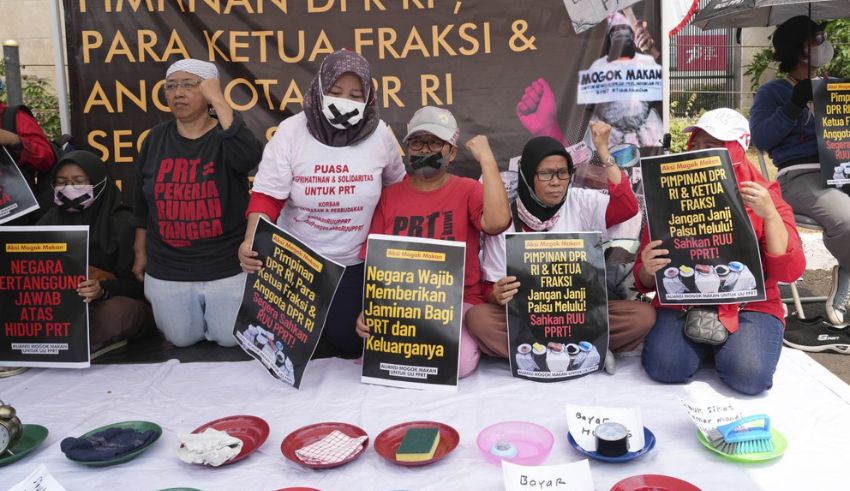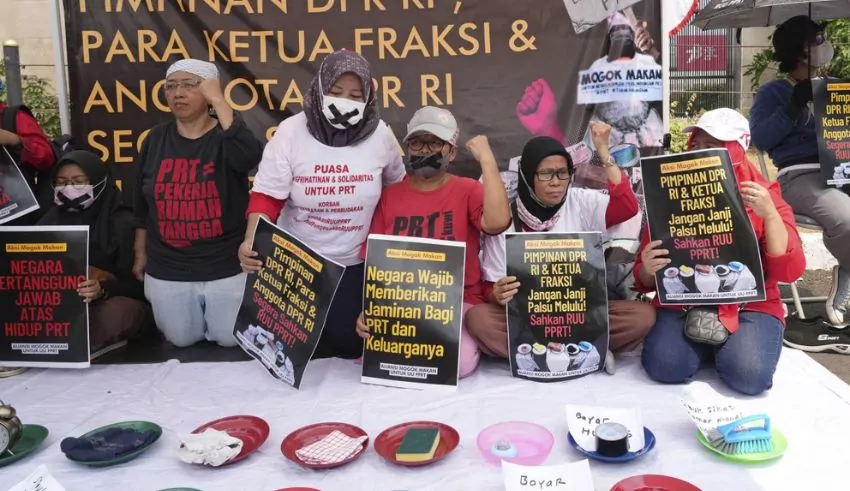

(C) The Star
Protesters in Indonesia have gone on hunger strike in order to hasten the approval of legislation that will provide better protection for domestic workers. The project was launched in response to the failure of a measure in parliament to protect the rights and welfare of the country’s domestic employees.
The hunger strike, which was organized by a coalition of trade unions and activist groups, emphasizes the importance of the proposed law. Domestic workers in Indonesia, who are frequently exploited and mistreated, have long called for extensive legal safeguards to protect their rights and well-being.
The law, which addresses concerns such as fair wages, working conditions, and abuse prevention, has encountered legislative delays. The hunger strike serves as a heartbreaking reminder of the difficulties encountered by domestic workers, as well as the critical need for legislative action to close current protection gaps.
Protesters are asking that lawmakers prioritize the bill and act quickly to solve the domestic workforce’s concerns. The hunger strike is meant to call attention to the situation of domestic workers and rally public support for the legislation’s approval.
The effort has spurred extensive discussion regarding the broader issue of labor rights and worker protection in Indonesia. Advocates say that strong legal safeguards are required to protect the dignity and rights of domestic workers, who frequently labor within private families and lack the legal protections offered to other sectors of the workforce.
The hunger strike also exposes the changing dynamics of Indonesian labor movement and advocacy. The hunger strike is a great illustration of how grassroots actions can rally public support and push for significant change as civil society organizations use digital platforms and social media to amplify their voices.
While the hunger strike is an effective method of protest, it also emphasizes the significance of coordination among civil society, legislators, and appropriate authorities. The bill’s passage would be a huge step forward in strengthening the rights and well-being of domestic workers in Indonesia.
Finally, the hunger strike launched by Indonesian protesters to push through legislation protecting domestic workers highlights the importance of addressing labor rights and worker protection in the country.
The determination of the demonstrators to draw attention to the issue reflects a growing movement asking for comprehensive legal measures to protect the rights and well-being of a sometimes marginalized part of the workforce. As the country grapples with these issues, the hunger strike serves as a powerful reminder of the significance of legislative action and collective efforts to bring about constructive change.
If you happen to breathe K-drama, then your 'May 2025' will most likely be well-rendered into a month! Romantic sagas,…
Since yesterday, May 2, 2023, at the Mall of Asia Arena in Pasay, Ahtisa Manalo has demonstrated her brilliance by…
“you’re nothing but a trying hard copycat” Character- Lavinia Arguelles Film- Bituing Walang Ningning (1985) Context- Lavinia confronts her rival…
During the first months of 2025 WWE released several prominent wrestlers who were part of their talent roster. Professional wrestling…
Seventeen year old sprint prodigy Rin Kubo continues to make athletic history in Japan. At the Shizuoka International Athletics Meet,…
NextRise 2025-the biggest startup and tech event in Asia-is ready to take place in Seoul on June 26-27 at COEX,…
This website uses cookies.
Read More